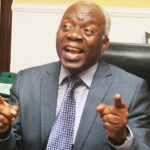
First, on the issue of corruption Obasanjo and the PDP took a position that the federal government can create institutions to fight corruption against the prevailing orthodoxy that crimes are state matters. In a legal sanctification of President Obasanjo’s position, in the case of Attorney-General of Ondo State V. Attorney-General of the Federation & 35 ors the Supreme court relied on Section 15 (5) of Chapter 2 of the constitution to justify the enactment of the ICPC Act. The court held that “therefore it is incidental or supplementary for the National Assembly to enact the law that will enable the ICPC to enforce the observance of the fundamental objectives and directive principles of state policy. This radical judgement suggest that we can indeed make provisions of Chapter two of our constitution justiciable.
The creation of the Independent Corrupt Practices Commission and the Economic and Financial Crimes Commission erected the scaffold for the construction of an anti-corruption infrastructure at the federal level. Today it appears that there is national consensus on the issue of anti-corruption agencies.
Confronted by the question of derivation and onshore/offshore dichotomy decided by the Supreme Court President Obasanjo went for “political solution” leading to the enactment of the law abolishing the dichotomy in the application of the principle of derivation in 2004. On the issue of derivation Obasanjo and PDP saved the country from a brewing crisis but more importantly laid another historic foundation of giving legal teeth to the 13% derivation in the constitution through abolition of the dichotomy.
On Sharia, the strategy of adopting a political solution was largely successful in calming frayed nerves and quelling a potentially catastrophic crisis. At the root of the strategy is the question of the role of the state in religion and extent of the use of the power of the federal government in resolving local issues.
In his second term, President Obasanjo, broke ranks with the ruling class and sought to define the philosophical underpinning of Nigeria, his government and his party. An avalanche of policies designed to reduce government included privatisatisation, concessioning, public private partnership, monetisation and sale of government houses.
Strong measures to improve service delivery and transparency led to coming into being of SERVICOM, a service delivery compact and the Bureau of Public Procurement, popularly called the Due Process Office. An environment of free market-reforms led to strong economic regulation and clear support for a vibrant private sector saw policies like banking consolidation, insurance consolidation, downstream deregulations and pensions reforms.
Promoting fiscal responsibility led to the creation of the Debt Management Office, passage of Fiscal Responsibility bill, creation of Excess Crude Account and tight management of foreign reserves.
The strong policy and thought leadership of the Obasanjo administration produced great results. Prof. Soludo recounted it succinctly recently, the PDP handed over a $550 billion economy (largest in Africa and 26th in the world), with 7.5% unemployment rate (better than European Union, France, Sweden, Belgium, etc although the underemployment figure is much higher); a stock of reserves of $30 billion; GDP growth rate averaging 6% over last 12 years; a relatively more diversified economy, with ICT penetration from 0.2% to over 60%.
To chart a way forward I believe we need to first define the reason for our existence as a nation. Amalgamated for British administrative convenience and bound by geography we need to move beyond unity, progress, peace and freedom to more philosophical precepts that reflects our national hopes, speaks to our fears and projects a sense of collective destiny and a shared future.
The chapter two of the 1999 constitution aptly named Fundamental Objectives and Directive Principles of State Policy in 24 sections made effort to capture the objectives and directive principles reflect our areas of agreement and what the drafters considered as the organising principle of the Nigerian state but regrettably made it non-justiciable.
I however, propose that all our former Heads of State, their Deputies, former Senate Presidents and their Deputies, former Speakers of House of Reps and their Deputies, Former Heads of service and Secretaries to Government of the federation, heads of all ethnic associations, heads of professional bodies, retired Service chiefs and Inspectors General should meet and draft a new charter for Nigeria. The Charter shall contain the reason for our union, the purpose of the union and the guaranteeof the basic rights, privileges and obligations of citizens. This charter shall be presented to the National Assembly as bill to amend the constitution and if passed would replace chapter 2 of 1999 constitution and would be justiciable.
The choice of the older generation in drafting this charter is to ensure that our collective experience as a nation is not lost. The National Assembly and State Houses of Assembly would provide opportunity for inter-generational dialogue and create the legitimacy required for the document. President Obasanjo I beseech you let this generation not pass before this shall come to pass.
The defining quality of our country in the past 45 years has been the distributional politics fuelled by oil revenue. This revenue stream, that may be impaired by developments in alternative energy, should be the seed capital to develop the manpower and infrastructure for a post oil economy. This thinking can be the basis of a new covenant that places the Nigerian at the center of governance and guarantees him irreducible minimums that aids him in the struggle for daily bread.
Our political parties can then build their ideologies around the strategies for achieving our national goals.
As I end this lecture today, the question every Nigerian should pose to our office seekers and elected officials should be:
· On critical national questions, where do you stand?
· On the role of government in the economy, where do you stand?
· On Federal government devolving more powers to the States, where do you stand?
· On fiscal federalism, where do you stand?
· On transparency and compliance to due process, where do you stand?
· On increased derivation in revenue sharing, where do you stand?
· On reducing the size of government, where do you stand?
· On Local Government autonomy, where do you stand?
Do not let any political party or aspirant deceive you with promises of bridges where there is no river, insist that the existential questions confronting our nation must be answered by those who seek to lead us.
(Concluded)
Text of a paper presented on the occasion of the public lecture organised by the Youth Development Centre of the Olusegun Obasanjo Presidential Library, Abeokuta, May 2017.

 Join Daily Trust WhatsApp Community For Quick Access To News and Happenings Around You.
Join Daily Trust WhatsApp Community For Quick Access To News and Happenings Around You.


